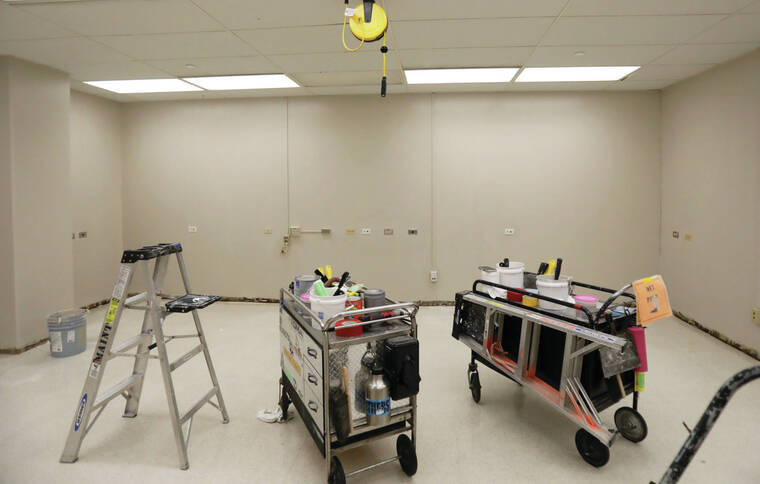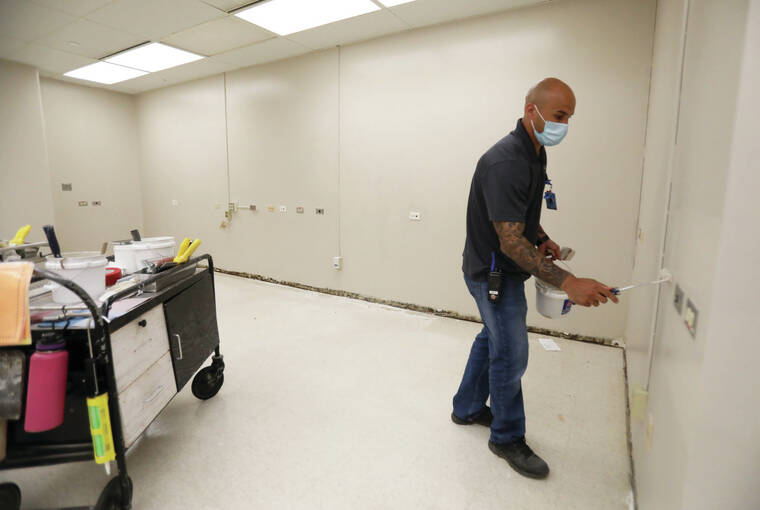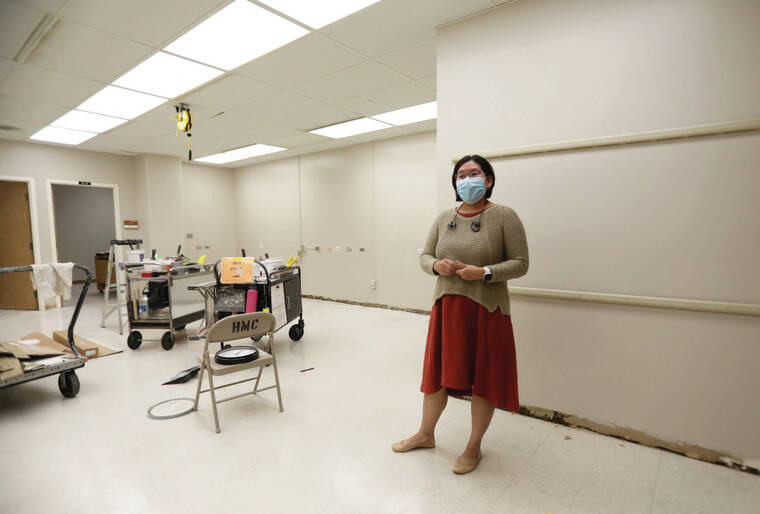Hilo Medical Center this month will open a monoclonal antibody clinic to treat patients with COVID-19.
HMC spokeswoman Elena Cabatu said the clinic, which will be located on the ground floor of the hospital, will be funded by the Federal Emergency Management Agency and staffed by FEMA-funded personnel.
“Our community’s very fortunate to have this designated site here in Hilo,” she said. “We’re still working out a lot of the logistics. The hope is to have the clinic up and running by the end of the month.”
The state Department of Health on Friday announced that a federal team of 30 civilians is being deployed to Hawaii to administer the antibody treatments.
According to the department, the clinicians are expected to arrive in Hawaii on Sept. 19. Six teams will be stationed at hospitals or federally qualified health centers across the state.
The U.S. Food and Drug Administration in November issued an emergency use authorization to Regeneron Pharmaceuticals for the use of two antibodies together to treat mild to moderate COVID-19 — one of several monoclonal antibody treatments to receive an EUA.
According to the FDA, monoclonal antibodies are laboratory-made proteins that mimic the immune systems’ ability to fight off harmful pathogens. The antibodies are specifically directed against the coronavirus’ spike protein and designed to block the virus’ attachment and entry into human cells.
The antibody treatments are authorized for patients over 12 with mild to moderate COVID-19 who are at high risk for severe illness.
The DOH said that treatment with the monoclonal antibodies within the first 10 days of the onset of symptoms could reduce the risk of severe illness, hospitalization and death.
HMC began prescribing antibody treatments “as soon as it became available to us in the first wave,” Cabatu said.
Currently, the treatment is available through an intravenous infusion in the hospital’s Emergency Department. The new clinic, however, will deliver the treatment in a series of four shots.
Cabatu said this makes the treatment more accessible.
“It also will take off some of the pressure on our Emergency Department by being able to administer the treatment and have them observed in a location outside of the ER,” she said. “… It will help us with the overall hospitalizations. There’s a lot of evidence it’s very helpful in keeping people out of the hospitals and becoming severely impacted by COVID, and this is very helpful given we’re in the part of the surge that has pushed our hospital beyond its capacity in terms of hospitalizations.”
Initially, Cabatu said that COVID-positive patients will be referred to HMC’s clinic through the Emergency Department, but that protocol is subject to change.
Just a handful of individuals at the hospital received Regeneron antibodies from April to July — two in April, one in June, and nine in July.
Guidelines were clarified in July, Cabatu said, and in August, 54 individuals at HMC and 22 at Hale Ho‘ola Hamakua received the treatment. Another 25 have been treated so far in September.
Queen’s North Hawaii Community Hospital announced in late August that it was expanding its use of Regeneron’s monoclonal antibodies.
The intravenous treatment is provided on an outpatient basis at QNHCH to COVID-19 patients.
QNHCH said in a press release at that time that studies show it can reduce the chances of hospitalization and death by up to 70% and can shorten the duration of symptoms.
Initial doses had been given in the Waimea hospital’s emergency room, but QNHCH now has dedicated a clinic to the treatment.
Patients have been seeking the treatment, but spokeswoman Lynn Scully said in an email that the hospital can accommodate more. A physician referral is not needed, but an individual must call 881-4833 to make an appointment.
Scully said QNHCH is not receiving federal funds for its clinic, but is still providing the treatment intravenously to emergency room patients if and when it’s necessary.
“The benefit of providing it in a separate clinic is that it keeps the ER available for truly emergency patients,” she said.
Judy Donovan, a spokeswoman for Kona Community Hospital, said the West Hawaii facility administers monoclonal antibody treatments in its Emergency Department and, less frequently, to inpatients if appropriate.
“We are not currently planning to operate a monoclonal antibody clinic at KCH due to limited resources,” she said in an email. “We don’t have adequate space within the hospital to establish a clinic, and our two-room emergency tent is on set up for overflow in the event that the current surge worsens. Beyond space constraints, we simply don’t have the employees to staff a clinic because of ongoing staffing shortages.”
Cabatu and the DOH, however, emphasizes that this treatment is not a replacement for a COVID-19 vaccine.
“This is just one of the tools in our tool kit to treat people who contract COVID,” Cabatu said. “… It will really aid in our community’s ability to fight COVID in terms of lessening the severity of the disease and the impact to their long-term health, in addition to reducing hospitalizations and additional impacts to the already overburdened health care system.”
Email Stephanie Salmons at ssalmons@hawaiitribune-herald.com.











